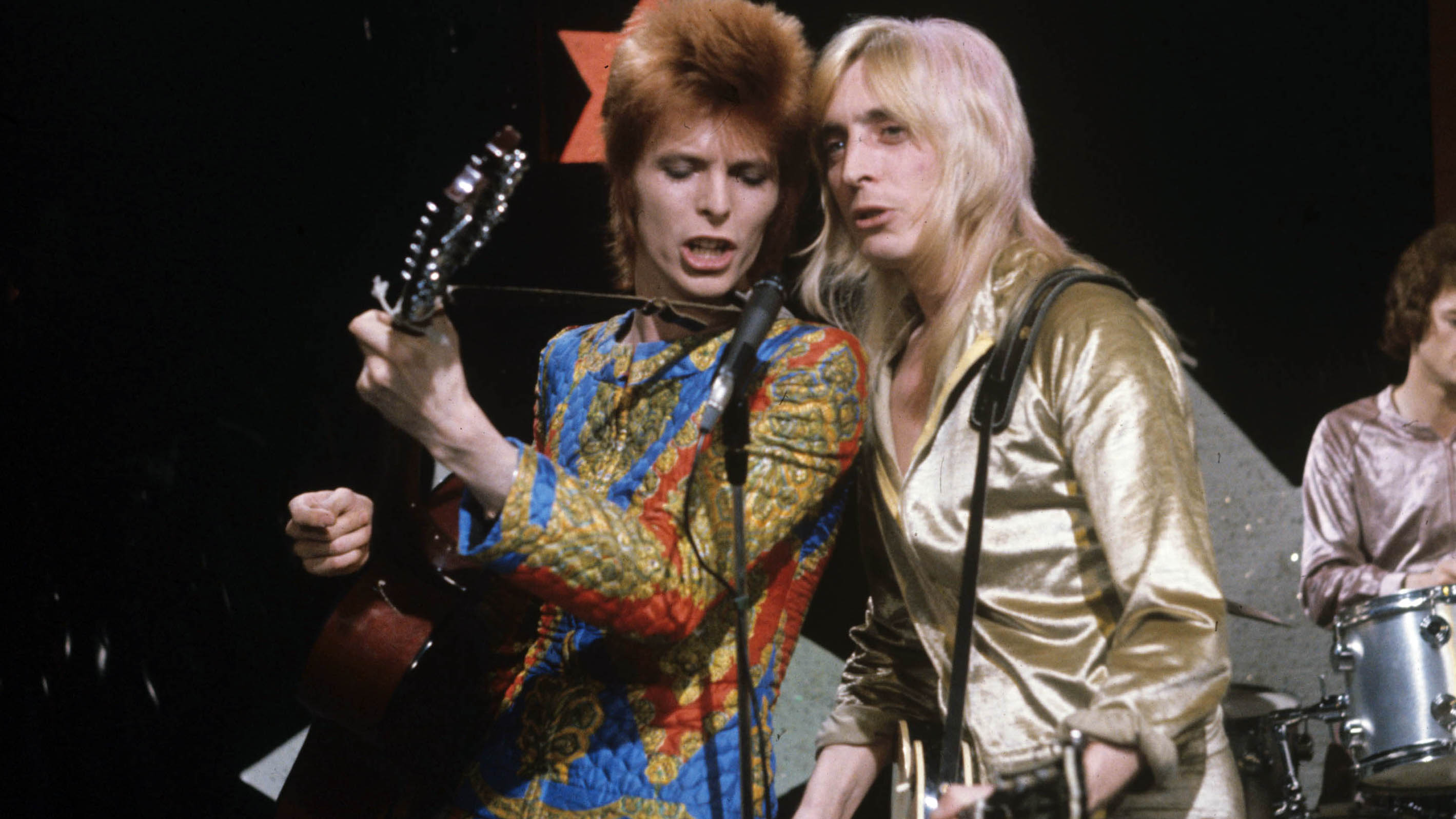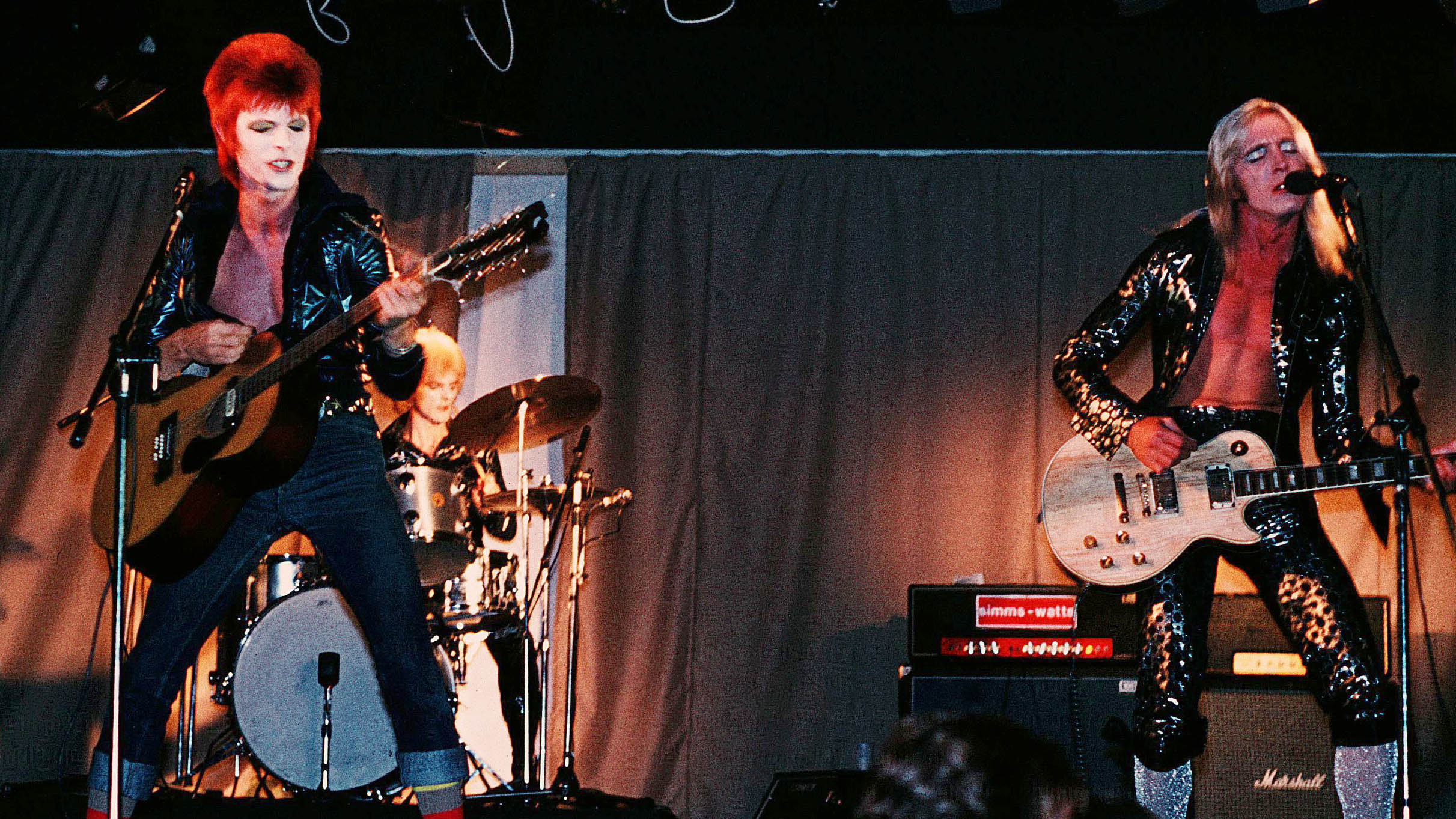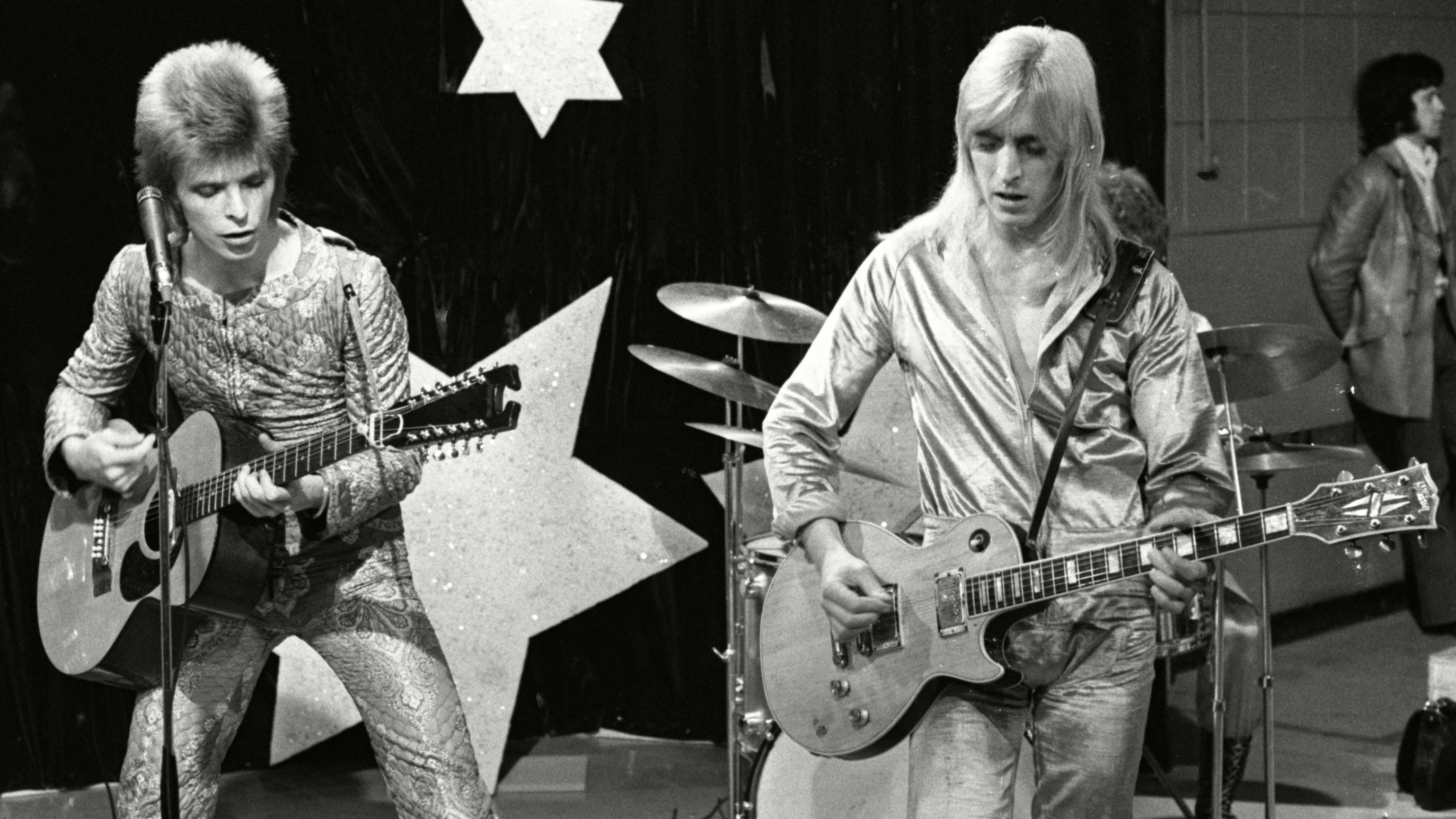Angie Bowie: how Mick Ronson and David Bowie made music history together
The origins of The Spiders From Mars

Beside Bowie
MusicRadar finds Angie Bowie sat in the penthouse suite of London’s Mayfair Hotel, where she’s been courting press to promote Beside Bowie: The Mick Ronson Story.
This year’s highly anticipated biopic features interviews from Rick Wakeman, Glen Matlock, Roger Taylor and even narrations from The Thin White Duke Himself, before his sad passing in January last year.
There’s only one slight problem: she doesn’t really like bringing up the past…
“I’ve gotten a headache from talking about all of this,” she smiles, after warmly greeting us into the room.
The only reason I’m doing this is because I made a promise to Minnie Ronson many, many years ago, that I would look after her boy…
“I don’t look back. To me, the past is like nothing, I don’t even consider it and it’s an inconvenience to talk about this. I haven’t listened to a Bowie record in 40 years! I usually make everyone pay when I have to talk about this shit - the only reason I’m doing this is because I made a promise to Minnie Ronson many, many years ago, that I would look after her boy…
“You know, I always felt I was older than him. Like a younger brother I had to look after - I only found out the other day from Wikipedia that he was four years older than me, haha! It didn’t occur to me. David was born in 1947, I was born in '49, and Ronno must have been '46… he was older than David! You thought I would have noticed doing his passports when we were travelling!”
Here, she talks us through her experiences in the whirlwind that was Ziggy Stardust And The Spiders From Mars - being married to its leader and witnessing the blossoming relationship between him and the prodigal guitarist…

Taking the Mick
How did David Bowie learn of Mick Ronson’s talents?
“David had a drummer called John Cambridge who was from Hull. We had Tony Visconti on bass, so all we needed was the right guitarist! John said he knew a shit-hot player up in Hull from a band called The Rats, so David said, ‘Let’s go on a road trip!’
“We drove up and went to investigate. So there was Mrs Ronson in front of me, and I asked if it was okay to see Mick. She invited us all in for a cup of tea while we waited for Mick to come back. I explained in the kitchen why we had come up and if she could help persuade Mick to do it.
“She actually told us he had a bad experience in bands; I didn’t know until much later that he took a break from London to come home, and when he returned his bandmates left a note saying, ‘Gone to the Bahamas!’ So he wasn’t keen on ‘working in’t Big Smoke’ any more.
“Then Ronno came in, and they all went outside to chat. When they came back in, Mick told his mum he was going back to London. I liked how smart his shirts were, so told Minnie, ‘If I promise to iron his shirts and make sure he eats, will that make you feel like it’s a good idea?’ I promised to look after him… and I did.”
What was it like seeing them play together for the first time?
David had done many things: he’d worked in an advertising agency and was as smart as a whip, he knew how to write things that were real catchy
“We had a rehearsal room downstairs, so when I heard this amazing music - the loudest kind of rock ’n’ roll - life felt much better. It felt like what we needed.
“David had done many things: he’d worked in an advertising agency and was as smart as a whip, he knew how to write things that were real catchy. His early tunes were practically advertising jingles, songs like The Laughing Gnome. He’d also been on TV with his long-haired boys club that were tired of being beaten up by yobbos…
“The industry noticed the albums, but no one knew what to do with him. He had to wear a blue suit to play working men’s clubs… David was not happy about that. Then he got a part in a film, The Virgin Soldiers, attempting the film aspect as well. There was a lot of trying. By the time I met him, David was beside himself. He didn’t know what to do, but this is where it all came together…
“David found a room in Beckenham which was cheap, so he didn’t have to live in London. Then he got that night in the backroom of The Three Tuns, which became a weekly thing so he had money. He didn’t need to work much… it changed the balance, he was happy and had time to write.
“One day, Ronno suggested Woody and Trevor, his boys from The Rats, and David was up for bringing them down. That was the beginning of The Spiders From Mars…”

Making magic
What do you remember about the working relationship between David and Mick?
“I always let them get on with it. It was never bad, no-one got mad or infuriated. When you live with each other, you can’t really do that. And I ran the house; there was no storming. I had ulcers by the time I was 20! David wrote all the tunes - he’d play them to Ronno who would go away and almost ruminate on it. Then, the next day, they would get playing.
“There were times David sang the solos to him… but Ronno was also classically trained. So what we’re talking about is advertising meets classical. David coming up with jingles and Ronno with the theory. It took a lot of work, not taking merit or credit away from their musicality; they still needed to figure out how to pull it off.
“With the band behind him, David became focused - he knew he could do a rock ’n’ roll album. But in the meantime, he wrote Hunky Dory and The Man Who Sold The World, which was brilliant, because he examined his own issues with his brother who was mentally ill.
“When people heard those songs, everyone in every family could relate - that was the beginning of the interaction with the audience. His songs were so true because people could recognise people in their own lives. That fuelled me.”
How long did it take for them to become the best band in the world?
“It took some time. The first gigs were… okay. David and the band rehearsed every Sunday at the gig; that’s how they found their feet. He wrote all these tragic love songs, way before Ziggy Stardust. There was his Letter To Hermione, and a bunch of great tunes. But there were still issues when we tried to sell it at shows. People wanted to see a loud band, not a folk singer.
“I’d say the time they got to Aladdin Sane, it was getting bigger and better in the UK. But America was something else: we were lucky to get full houses on the coasts, but the middle was dicey, very dicey. They had to warm up to it and it took some doing.
“America was very different back then: I really didn’t want to go back, because I got caught having a relationship with a girl at Connecticut College For Women. My girlfriend was put into a psychiatric ward for four years, so I ran for my life! I thought, ‘Fuck going back to America!’ so tried to figure out how to stay in England.”
What were the scenes like backstage - was it as debauched as the '70s were famed for?
“I’m sorry, but no! It was a bunch of sweaty musicians waiting to go back to a hotel. Once the tours got more organised, I always had a suite with a kitchen. Everyone would come and eat, then I’d send them off to party so I could go to bed early.
“They would probably ensure all kinds of debauched things… maybe not actually, they didn’t do drugs in those days. They might have smoked a joint, but not Ronno - he just drank. I mean, David drank barley wine… think about that!
My favourite work by Mick wasn’t necessarily with David. Weren’t Born A Man, the Dana Gillespie album he arranged strings on, was brilliant for its musicality
“Backstage, it wasn’t like Led Zeppelin or anything. I ran a tight ship. I wanted them good the next day. I promised Mrs Ronson I’d take care of him and I did. I carried penicillin when he got the clap, because those girls would not leave that boy alone!”
What do you think was Mick Ronson’s best work?
“I’d say my favourite work by Mick wasn’t necessarily with David. Weren’t Born A Man, the Dana Gillespie album he arranged strings on, was brilliant for its musicality. Then there’s what he did with Lou Reed on Perfect Day… it was everything I imagined Mick could do as a producer.
“Don’t get me wrong, I liked him on stage playing guitar like anybody else. But I understood everyone has to expand: actors become directors, musicians become producers - artists need to be in control of their destiny.
“It was a beautiful experience when David left to go to the States and Ronno was left to do the Dana Gillespie album. He just blossomed. He knew exactly what he was doing from everything he’d learned from David and Tony Visconti. They all just got better and better; it was so exciting to watch.”
Beside Bowie: The Mick Ronson Story will be shown on Sky Arts on 27 May.
Amit has been writing for titles like Total Guitar, MusicRadar and Guitar World for over a decade and counts Richie Kotzen, Guthrie Govan and Jeff Beck among his primary influences. He's interviewed everyone from Ozzy Osbourne and Lemmy to Slash and Jimmy Page, and once even traded solos with a member of Slayer on a track released internationally. As a session guitarist, he's played alongside members of Judas Priest and Uriah Heep in London ensemble Metalworks, as well as handling lead guitars for legends like Glen Matlock (Sex Pistols, The Faces) and Stu Hamm (Steve Vai, Joe Satriani, G3).
